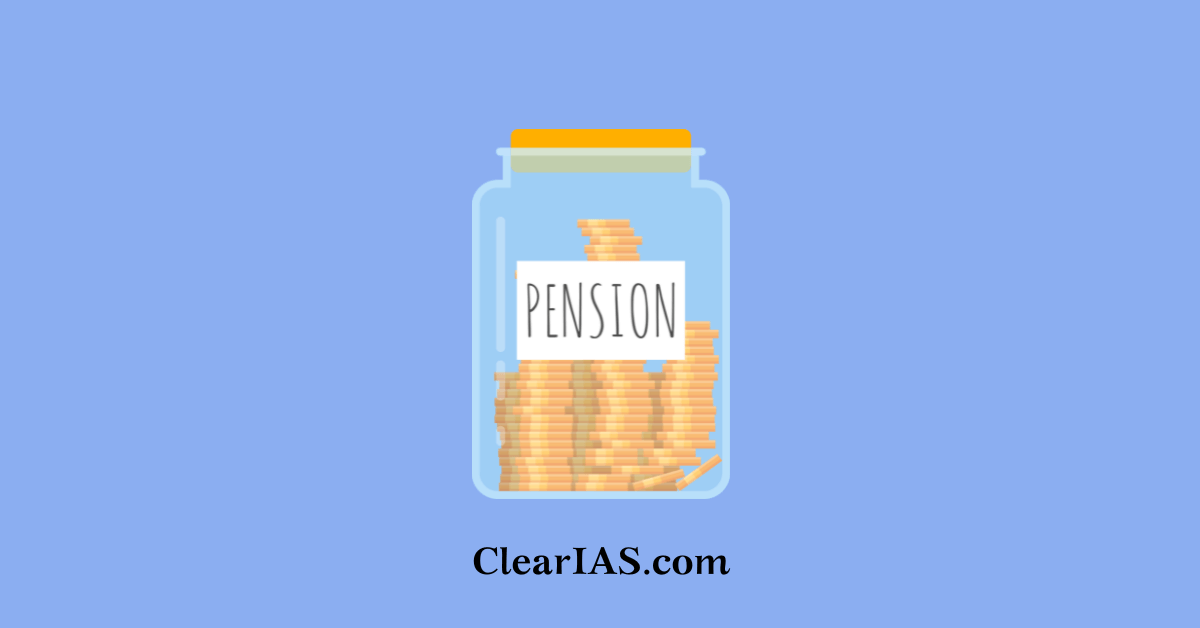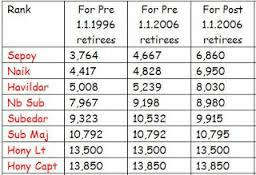
What is One Rank One Pension (OROP) concept?

One Rank One Pension (OROP) means the payment of the same pension to military officers for the same rank for the same length of service, irrespective of the date of retirement.
As an example, consider an officer ‘A’ who had been in service for 15 years from 1980 to 1995. Also, consider another officer ‘B’ of the same rank and been in service for 15 years from 1995 to 2010. As per the OROP concept, both officers – since having the same rank and same length of service – should get the same pension.
Current System of Pension
The present system of determining pension depends on the last salary drawn. Fifty percent of the last salary drawn is typically the pension over and above which you get the other allowances.
In the current system, the importance is given to the last salary drawn, and not the length of the service.
What is the present issue with the defense pension?
- Due to the present model of pension, a lieutenant general who retired in 1995 will get a pension that is 10% lower than a colonel who retired after 2006.
- Similarly, a jawan who retired in 1995 will get a pension which is 80% less than his counterpart who retired on or after 1 January 2006.

- The basic demand underlying OROP is to do away with the anomaly of doing away the disparity.
Arguments and Challenges
Arguments in Favour
- The shorter period of service of military officers: The defense personnel is made to retire at the age of 33 to 35 years due to the necessity of maintaining a younger army whereas the officer of civil side retires at the age of 60 years.
- It is the moral obligation of the state to look after the welfare of the soldiers who served the nation.
- A lowered pay status compared to the civilian counterparts with less period of service affects the morale of forces.
- The issues, veterans emphasize, are of justice, equity, honor, and national security.
The Challenges
- Financial hurdle as the estimated time cost of implementation is 8000-10000 crore rupees. This will increase on every further revision of salary.
- Expenditure on arrears would be around 10000 crore rupees.
- Lead to demands from other army personnel like CRPF, CISF etc.
- It is also an administrative challenge due to lack of records going back to many decades.
When did it all start?
In 1973, Indira Gandhi led congress terminated the OROP, the basis for deciding pension of Indian Armed Forces personnel which had been in vogue for 26 years since independence through an exparte administrative order. In addition to this, 3rd pay commission increased the pension of civilians and reduced pension of soldiers.
What is a Rank-Pay?
- The Rank pay is a scheme implemented by the Rajiv Gandhi led Indian National Congress (INC) in 1986, in the wake of 4th Central Pay Commission that reduced the basic pay of seven armed officers’ ranks of 2nd Lieutenant, Lieutenant, Captain, Majors, Lt. Colonel, Colonels, Brigadiers and their equivalent in the air force and Indian Navy by fixed amounts designated as rank pay.
- The reduction in grade pay apart from causing asymmetries in rank equivalence between officers from IPS and armed forces affected the basic pay, allowances, promotion prospects, status and pension of thousand officers in the service in Jan 1986 and decades after that.
- The issue of OROP was mentioned in the 4th and 5th pay commissions but nothing materialized. This made the veterans protest and return their medals. The government then appointed the Koshiyari committee.
Koshiyari committee
- Koshiyari committee is a 10 member all-party parliamentary panel formed under the chairmanship of Bhagat Singh Koshiyari. They have submitted the report in December 2011.
- The committee accepted the demands of the veterans and defined OROP as: “It implies uniform pension be paid to armed forces personnel retiring in the same rank with the same length of service irrespective of their date of retirement and any future enhancements in the rate of pension to be automatically passed on to the past pensioners.“
- This was accepted by the government as well as the veterans and this definition of the OROP is the basis for the ex-servicemen’s demand for implementation of OROP.
- Despite the report, the UPA government was slow to reach out to the veterans and implement OROP.
- Finally, the UPA government issued the implementation order on 26th February 2014 and released Rs. 500 crores in the interim budget which was grossly inadequate to satisfy the veterans.
Current Status of OROP
- NDA government has accepted the OROP and already released Rs. 5500 crores to serve the purpose, but still, there are some grievances from the veterans’ side.
Government Proposals |
Veterans Demands |
Pensions will be refined for all pensioners retiring in the same rank as the average of the minimum and maximum pensions in 2013 |
Veterans want the maximum to be taken as the base. |
The scheme is effective from July 1, 2014, with 2013 as the base year. |
Veterans want OROP from April 1, 2014, and 2015 as the base year. |
Proposed a review every 5 years |
Wanted an annual review |
- The veterans noted governments’ proposal as one rank many pensions since the review of 5 years would lead to differences in pension between senior and a junior.
Demands of veterans vs 7th Pay Commission Recommendations
- Veterans demanded the principle of same batch-same salary as in the case of their civil counterparts.
- Military services pay to be extended to Major general as well as Lieutenant-general.
- Civil–Military pay parity.
- None of these was recommended by the 7th pay commission. The recommendations of the 7th pay commission also were not satisfactory and the demands of the veterans were not accepted.
Steps to be taken ahead
- Supreme Court of India, after 6th Pay commission, suggested either the inclusion of representation of armed forces in the central pay commission or to constitute separate armed forces pay commission. This must be implemented.
- The government should resolve the issue of civil-military disparity as well as the combat, non-combat officers’ disparity in time bound manner.
- This is necessary to honor the military and give them what is rightfully theirs.
Also Read:
Article by: P. Ujwala.






Sir notes available in hindi
some facts r missing….it is not only for but for OTHER RANK defence personnel also…..all r not made to retire early….only guys who got through ssc entry retire early…rest all retire after completing 30-5 years of service or age of 58 whichever is earlier…
Good
I retired on 31st Jan 2017 after 15 years of defence service. May i get this OROP?
I retire after 16yrs & 3months of active service as a petty officer electrical power from the Indian navy in jan; 1980.But to my surprise, navy is giving me a pension of a seaman thus depriving me of my rank pension, but the authorities are not bothered to correct this blunder mistake, & give me My correct rank pension.
My husband had six years service in other ranks before getting commission. He took pre mature retirement after completing fifteen years as a commissioned officer. So his qualifying service is twenty one years. So will I get the family pension of twenty one qualifying years ?
My husband had six years service in other ranks before getting commission. He took pre mature retirement after completing fifteen years as a commissioned officer. So his qualifying service is twenty one years. So will I get the family pension of twenty one qualifying years ?